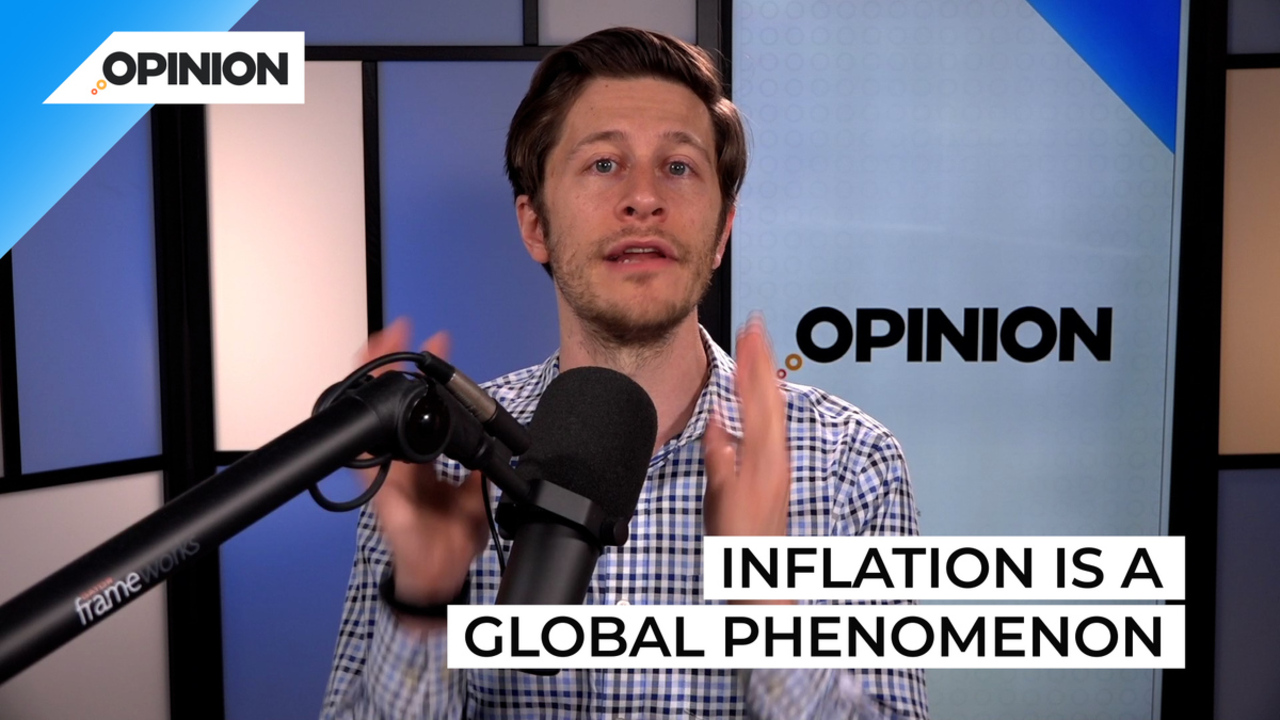
Commentary
-
Our commentary partners will help you reach your own conclusions on complex topics.
All right. Let’s talk a little bit about inflation. Inflation is a problem. I have not hid that. It is a problem. I have not hid or I have not hidden. I’ve not hidden. Geez. That it’s a problem. Um, for many, for many Americans, uh, in particular, depending on, uh, what part of the country you live in, how far you commute, whether you need gas to commute, et cetera. Uh, since the beginning, one of the things there’s two important things to understand. I wanna try to add something new rather than repeat the same thing or argue about whether it’s Joe Biden’s fault or whatever the case may be. First and foremost, globally. When you look at inflation, number one, it is a global phenomenon. There are countries with dramatically higher inflation over the last year than the United States. And there are countries with lower inflation than the United States.
This depends on a number of different things, including how involved in different sectors of the economy. The government is, uh, as well as what type of an economy it is, uh, regarding industry and what industry is more typical in certain countries. But inflation has been a global phenomenon and in many places it’s much worse than in the United States. That’s number one. Um, and as such, particularly, particularly in an era of globalization and, um, interconnectedness, it is very difficult for one Western nation or O E C D country or whatever designation you want to use. It’s very hard for one country to solve or reduce inflation. The most important thing to understand is that high inflation lowers prices. And this is again, when we talk about what can be done sometimes when we think about things as gargantuan as the economies of major countries like the United States, you have to understand that there are processes that only given the opportunity to work actually will make an impact.
Joe Biden can’t come out in lower inflation. Um, uh, president Macron in France, can’t come out in lower inflation, but there’s a mechanism in which in inflation, meaning the increases of prices causes people to buy less. When people buy less and demand fewer goods and services, it will eventually lower the prices of those goods and services. It’s sort of just like a basic economic concept. Now, of course, it’s more complicated when you talk about countries because you have currency issues and, and when you have trade, the relative values of currencies can make it so that even if demand goes down in currency adjusted, uh, uh, uh, when you adjust currency for the us dollar, for example, you could have demand go down and prices still, still go up. You can have these things in the short term, but understand that, you know, when you think about mortgage rates, the mortgage rate, the average mortgage rate is
The price of borrowing money to buy a home. If the price of something goes up, the demand will go down. And so the example I often give is imagine that with a 3% mortgage rate, you go, okay, let’s see, I’ve got a, I’ve got a $30,000 down payment. Um, and I can only afford $1,200 a month. So that means that if the mortgage rates are 3%, I can’t get a house any more expensive than $300,000. The numbers don’t matter, I’m making it up. So you set your budget at 300,000 and a lot of people might set their budget there. Um, when the mortgage rate goes from 3% to 5%, you’ve still got your $30,000 down payment. But all of a sudden, if you’re limited to only 1200 bucks a month for a mortgage, you can no longer have a $300,000 house because you’re gonna be paying more to service the mortgage debt.
So now your budget goes from 300 to, you know, 2 85. This happens to a lot of people, but the seller of a home really wants 300 K. It’s gonna take them longer to sell. This will influence the seller to cut the price of the home. And so we have to understand that this is a, this is a mechanism that works now in my home country of Argentina, in Venezuela, in, in countries with out of control inflation that never gets better. It never seems to get better. There are different things going on than in the United States. So it’s become very popular, very en Vogue for some on the right to say, uh, Joe Biden printing money is gonna make us like Venezuela. Like, okay, listen, first of all, this is not unique to Joe Biden. The, uh, uh, the, the mechanisms that we are seeing in the United States, first of all, if you’re talking about COVID stimuli, Trump did two of them and Biden only did one.
Uh, but that let’s not, let’s not even engage in that, but the United States is a very different country than Argentina and Venezuela when it comes to, uh, energy use, when it comes to manufacturing, when it comes to industry, when it comes to strength of currency, stability of, of, uh, uh, so many different elements of society. So it is not an apt comparison. Have there been long periods of inflation in Western or O E C D or developed industrialized countries? Yes, of course there have. Um, but this mechanism in a country like the United States should work now, will I end up eating my hat in a year? If it doesn’t sure. Yeah. But understand the mechanism. Let’s see where we are. Six months from now. I believe inflation will be notably lower.
-
JD Vance doesn’t add much to Trump ticket
At the 2024 Republican National Convention, GOP presidential candidate Donald Trump selected Sen. J.D. Vance, R-Ohio, as his running mate. With Trump expected to win Ohio in the Electoral College, some observers have questioned why Trump ultimately decided on Vance. One explanation is that Vance said he would have helped Trump overturn the results of…
-
How likely is a landslide victory in November for either candidate?
With President Joe Biden’s poor debate performance and the recent attempt on former President Trump’s life, some Democratic lawmakers are warning of a landslide Republican victory and urging Biden to step aside. But three new major national polls show signs of hope for Biden’s argument that he must remain the Democratic nominee. Watch the above…
-
Should Biden step aside or not?
President Joe Biden looked and sounded notably less healthy than usual during his recent debate against Donald Trump. Biden’s performance set off alarms for some Democrats, who began discussing the possibility of running an alternative candidate. While there may be promising candidates waiting in the aisles, it’s not clear if or how Biden could or…
-
How Biden can win Florida
Donald Trump is currently projected to win Florida again in 2024, just as he did in 2016 and 2020. But, in response to Republican Florida Gov. Ron DeSantis’s legal and cultural war against the Left — including what liberals say is a war on women’s rights, education and free speech — many Floridian voters appear…
-
Donald Trump is mentally unwell
Medical experts and observers have long questioned Donald Trump’s mental and psychological health, with malignant narcissism appearing as the most consistent diagnosis of Trump’s supposed illness. Those discussions have fallen to the sidelines in recent years, but resurfaced in response to certain speeches and behavior from the former president. Watch the above video as Straight…
Latest Opinions
-
 U.S. Department of Defense
U.S. Department of Defense
Congress still trying to figure out how to reduce wasteful military spending
-
 DVIDS
DVIDS
US Navy, Air Force making waves with new weapons at RIMPAC
-
 Getty Images
Getty Images
Israeli PM Netanyahu meets with Trump at Mar-a-Lago
-
 Getty Images
Getty Images
Growing US nuclear power resurgence reaches the nation’s heartland
-
 Getty Images
Getty Images
Beer from the sun, other solar thermal projects get government funding
Popular Opinions
-
In addition to the facts, we believe it’s vital to hear perspectives from all sides of the political spectrum.


